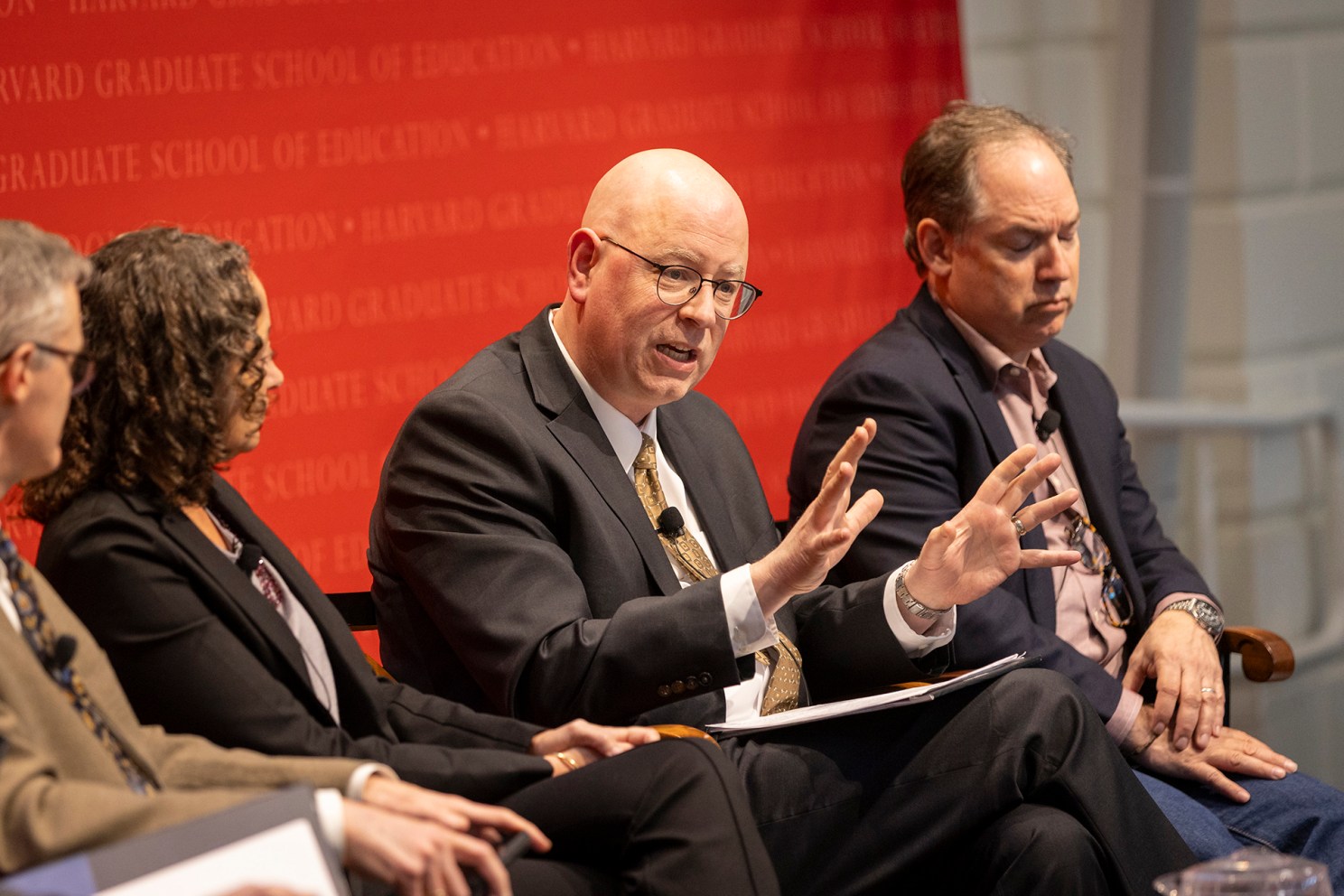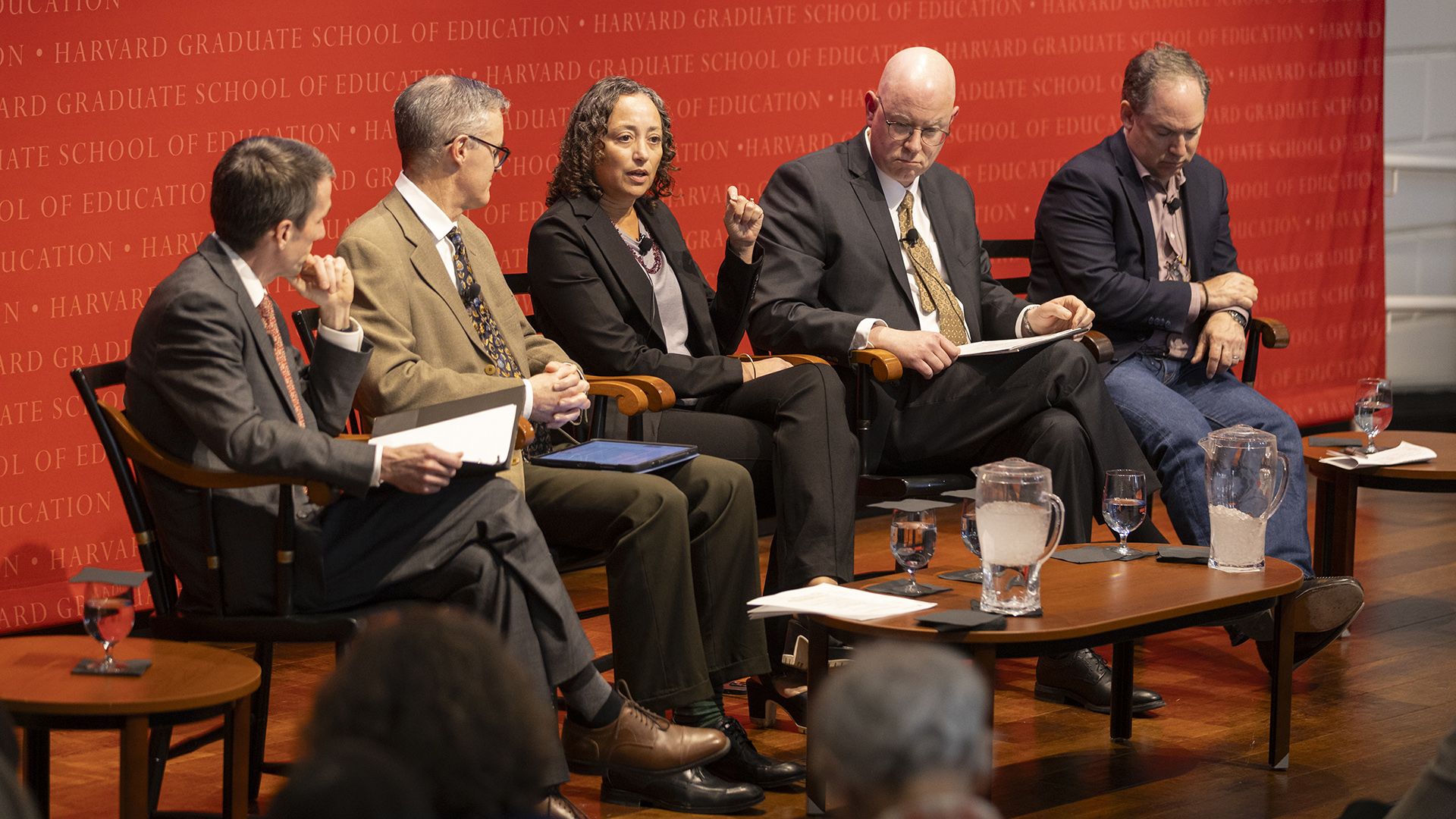Envisioning a country with no Dept. of Education

Panelist Neal McCluskey, who favors abolishing the Department of Education, expressed concern over the government’s “haphazard” methods.
Photos by Niles Singer/Harvard Staff Photographer
Panelists weigh potential consequences of Trump plan to eliminate agency, transfer authority to states
A panel of experts convened Tuesday at the Graduate School of Education to weigh the potential consequences of President Donald Trump’s executive order to dismantle the Department of Education.
A cabinet-level executive branch agency, the department oversees policy, administers federal funding for schools, and ensures equal access to education. It also manages federal student aid programs, including Pell grants, supports research, and collects data. The agency oversees a budget of nearly $80 billion, of which about $34 billion helps low-income students and students with disabilities. It also manages more than $1.6 trillion in student loans.
In the days since the president’s order to “facilitate the closure of the Department of Education and return education authority to the states,” the agency, led by Linda McMahon, has canceled research contracts and cut staff by nearly half. Democratic attorneys general, teachers’ unions, and education organizations, among others, have filed 19 separate lawsuits challenging the administration’s education agenda, arguing that the move to close down the agency is an illegal overreach. The department was created by an act of Congress in 1979, and opponents of the Trump order say that shutting it down would also require congressional action.

Educators, students, and families find themselves in a confusing and unsettling environment, said Martin West, Henry Lee Shattuck Professor of Education, who moderated the conversation.
Neal McCluskey, director of the Center for Educational Freedom at the Cato Institute, favors abolishing the agency and restoring control of public schools to the states, but was critical of the government’s methods.
“My biggest concern is that this is being done so haphazardly — like a bull in a china shop,” he said. “I want to see the Department of Education go away, but if it’s done without any planning, in a way that is haphazard, that is just chaos, I’m afraid that it’ll make it look like what I want is horrendous.”
Andrew Rotherham, co-founder and senior partner at Bellwether, a national educational nonprofit, highlighted the potential fallout of lost funds in high-poverty areas across the country. Through Title I, the department provides financial assistance to schools with high numbers of children from low-income families.
“You’re obviously going to see impacts in high-poverty school districts,” said Rotherham. “In terms of the politics of this, it’s important to remember that that money gets spent in red communities, blue communities, red states, blue states, purple states. Everyone’s affected.”
“It’s important to remember that that money gets spent in red communities, blue communities, red states, blue states, purple states. Everyone’s affected.”
Andrew Rotherham, Bellwether
Catherine Lhamon, a former Ed Department assistant secretary for civil rights, lamented the implications for regional civil rights offices, which are responsible for enforcing protections guaranteed by the Constitution and federal law. Seven of 12 offices have been shuttered, she said.
“That means that fewer than half of the investigators who are struggling to do the work already are now left to do the entire nation’s civil rights enforcement work, and to guarantee that no one experiences discrimination based on race, sex, and disability in schools,” said Lhamon. “When I left on Jan. 20, our staff were carrying on average 50 cases per person, which is an untenable caseload.”
She added: “What we know is that schools are incubators for how to be in the world, how to participate in democracy, and how to be effective in our communities. … We are walking away from six decades of commitments to core protections for who each of us is. I find that terrifying.”
The panelists also voiced concerns about cuts to research administered through the agency’s Institute of Education Sciences, which has seen more than 100 layoffs. Brian Gill, a senior fellow at Mathematica, noted that his organization last month saw the cancelation of several projects contracted by the institute. The long-term effects are a big worry, he said.
“Changes to research aren’t going to have immediate effects in schools,” Gill said. “In the research world, it’s been a big deal. If you care about developing research and new programs in education, and making the schools work better in the long term, this is likely to matter.”




